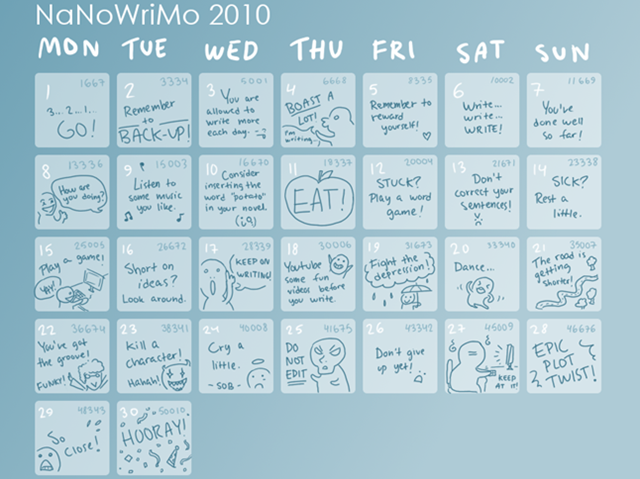For all the busy nanowriters out there, here’s a best-of for October at Scriptwriting Tips. Whether you’re writing comedy or horror, there’s something here for you. Hope they help you push forward!
421: For god’s sake, don’t throw away/delete your original notes, no matter how much your idea may have changed. You’ll need them for when you get halfway through the script and realize you have no idea why you were ever interested in this concept.
422: If you can’t explain your screenplay idea to somebody in a casual conversation, you don’t actually have a screenplay idea. What you probably have is a setting, a character or a cool theme — now take it to the next level.
423: If you’re going to break the rules, do it in spectacular fashion. That way it’s obvious that you’re breaking the rules, not ignorant of them.
424: Better to outline too many scenes, characters and subplots than to run out of material in the middle of Act Two. Think of it as scouting out the terrain before taking the best route.
427: Your unique point of view is your most valuable asset as a writer… assuming your unique point of view is interesting.
428: Don’t open a story by having everything that could possibly go wrong happen to your protagonist (husband leaves her, fired from job, dog runs away, etc.). Pick one thing — the one that hurts the most.
432: Jokes can’t save a scene that’s not advancing the plot or affecting the protagonist. Comedy should never be the entire point of a scene.
433: Your screenplay is not about what happens. It’s about who it happens to.
434: You have to truly, deeply, unconditionally believe in your premise. That process starts with being able to sum it up in one or two sentences.
Guest 4: Nothing breaks immersion quite like a character saying, “This isn’t the movies, this is the real world” or “This always works in the movies”. As soon as you do, we remember we’re watching a movie.
Guest 6: Male writers, is getting into the mind of a woman really THAT much harder than getting into the mind of a psychopathic criminal with no qualms about killing? Women would like to be the hero once in a while, too.
Guest 7: Please actually hang out with or talk to minorities before you put them in your screenplay. We can tell when everything you know about us comes from glances and snippets of conversation you hear at the checkout line.
Guest 8: Audiences like thinking they’ve got it all figured out. So give them an “I knew it!” moment…. then pull the rug out from under them.
436: When you’re writing horror, dread is your friend. What’s dread? It’s the man in the mask. It’s the closed door at the end of the hallway. It’s what’s waiting for us when we turn on the lights. A sense of something horrible that can’t be avoided, only delayed.


